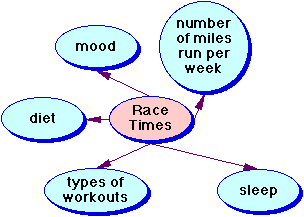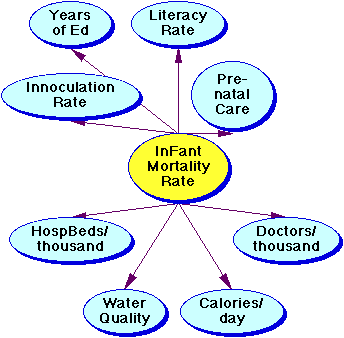without purchase of a site license.
CRUNCHING NUMBERS
 INDEX - MODULE 1 - MODULE 2 - MODULE 3
INDEX - MODULE 1 - MODULE 2 - MODULE 3
MODULE 4 - MODULE 5 - MODULE 6
 MODULE FOUR
MODULE FOUR 
What do we want to know?
What do we want to crunch?
| Databases are good tools to weigh the importance of variables. It is very important to understand what variables are. They are the "key ingredients" or "major factors" which explain how and why something happens. Variables usually interact with each other.
A high school runner who wants to optimize performance may keep a chart showing the relationship between race times and key variables such as sleep, diet, mood, number of miles run per week and types of workouts performed each day.
We build a database to test which variable has the most powerful effect on the one we hope to change or improve. Medical consultants considering how to lower the infant mortality rate in an American state might create a chart which would look like this:
1)
2) When your list is complete, predict which variable is the most powerful or influential? Explain your choice in your word processor. This is a bit like posing a hypothesis. "If you give a student a good breakfast before a test, then . . ." 3) Remember that we build databases to test hypotheses and explore questions. Now that you have posed hypotheses, identify and list questions about your topic which might be answered with construction of a database. 4) What is the most important insight you gained from this lesson?
|
| Copyright Notice: © 2000, FNO PRESS, all rights reserved. These lessons may not be used for professional development without purchase of a site license. The icons are used with permission from Jay Boersma, whose site can be found at http://www.ECNet.Net/users/gas52r0/Jay/home.html
These lessons are licensed to the State of Mississippi for use on © 2000, Jamie McKenzie. All rights reserved. These lessons may be copied by non-profit, public learning institutions only for use with their own staff. All other purposes are expressly prohibited without explicit permission. |


